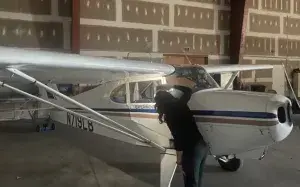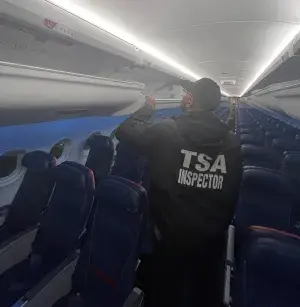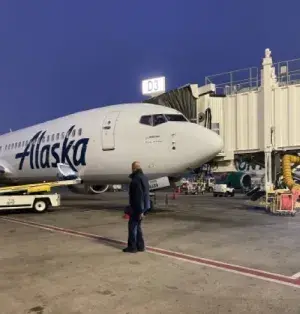
Work hours can vary for TSA employees on the frontlines, but for TSA inspectors (TSIs), they're often on the job protecting our aviation system while most of us are asleep.
Many of our TSIs are on duty overnights to make sure our nation’s aircraft and airport operators are complying with TSA’s rules and regulations for safe travel.
Three of our agency’s TSIs explained why they frequently work wacky hours.
Shana Castellanos – Wichita Dwight D. Eisenhower National Airport
Shana Castellanos joined TSA as a part-time screening officer in 2004, the agency’s early days. After leaving the floor as a supervisory officer to become a TSI in 2016, she is now dual certified as an aviation and cargo inspector.
“TSIs identify trends and incidents that could develop into or are already a security or safety problem for the aviation network,” Castellanos described. “As a TSI, you conduct complex inspections of regulated entities, such as federalized airports, commercial airlines, repair stations, cargo facilities, flight schools and individual flight instructors to name a few.”
She and TSIs across the nation also conduct investigations when TSA identifies security violations against aircraft operators and individuals.
“For example, when a passenger brings a firearm or any type of weapon through the TSA screening checkpoint, the TSI gathers and compiles the facts and information needed to recommend an enforcement action, ranging from a warning to potential civil penalties,” noted Castellanos.
While TSIs complete much of their work during normal business hours, they’re expected to work overnight shifts. Castellanos said she typically works overnights during airline inspections.
“I expect to stay overnight when I travel to a regional airport and must observe nightly aircraft searches or early morning operations,” she said. “Sometimes, airlines are gearing up for the first flight of the day at 4 a.m., and I need to be there.”
Despite having a family, Castellanos said she loves working overnights.
“In Kansas, we have the unique opportunity to work closely alongside all of our stakeholders, which gives me the opportunity to really familiarize myself with the airport and their operational needs,” she said. “I get to meet and talk with people I wouldn’t normally see during normal business hours. Overnights are an opportunity to share with others why I am there – always spreading the See Something, Say Something® message.”
To balance her work and life, Castellanos said she makes sure to plan ahead and put her overnight shifts on the calendar early.
“I plan my whole work plan, a year of inspections, in October,” she explained. “I plan a more pinpointed schedule month-by-month.”
When asked about the importance of inspections, Castellano replied, “They remind aviation workers not to become complacent, whether it’s inspecting and maintaining control of a cargo shipment or ensuring the citizenship of a flight student or keeping airport perimeter access points secure. TSIs are there to ensure compliance is being met, which is necessary to uphold security standards.”
Michael Challenger – Baltimore/Washington International Thurgood Marshall Airport
For TSIs, Michael Challenger said flexibility is key, particularly when executing inspections.
Challenger recently celebrated his third anniversary as a TSI at Baltimore/Washington International Thurgood Marshall Airport after first joining TSA as a screening officer in 2007.
“To adequately assess the compliance posture of an entity, the TSI needs to conduct activities during all hours of operation,” he noted. “Overnight activities also serve as a way for TSIs to demonstrate a command presence and address insider threat mitigation activities outside of the typical operational hours.”
Challenger said local TSIs will often pair up during overnight hours to support each other and expand inspection coverage.
“Generally, the environment is quieter than daytime operations, and there’s a greater possibility of conducting additional vulnerability assessments outside of the public’s view,” he described. “A great portion of what is considered ‘transportation security’ occurs behind-the-scenes beyond the security screening locations. The TSI’s role helps ensure other aspects of transportation security are in place and that all parties in the civil aviation and surface communities are complying with regulations and standards for the overall accomplishment of TSA’s mission.”
Challenger believes working overnights limits the distractions TSIs may face during normal business hours.
“We typically have less distractions from airport patrons and personnel, therefore allowing a different perspective of the regulated entities,” he said.
Challenger’s inspiration to become a TSI evolved from his participation in the TSI Shadow Program in 2013, which allowed him to see what took place in TSA beyond the airport security screening checkpoints.
“I grew more and more intrigued by the compliance and enforcement aspect of the position and believed my years of experience could be an asset to TSA and a great opportunity to further my skillset,” he recalled.
Stephen Pulliam – Hartsfield–Jackson Atlanta International Airport
It’s not unusual for TSI Stephen Pulliam to pull a 9 p.m. – 5 a.m. or 11 p.m. – 7 a.m. shift. He said it’s often based on the type of inspections he’s conducting.
Pulliam, the lead aviation inspector for Hartsfield–Jackson Atlanta International Airport (ATL), has been a TSI for more than 12 years and said overnight shifts are typically based on three types of inspections.
- Catering inspections – “Some air carriers conduct their catering security searches very early in the morning, between 2-4 a.m. I may come in at midnight to properly prepare and conduct other daily duties before conducting the inspection.”
- Overnight inspections – “All aviation inspectors at ATL are assigned to conduct inspections of air carriers’ overnight aircraft. We make sure all aircraft are properly secured by checking each one at every concourse, usually starting at midnight.”
- Aircraft security searches – “Based on the air carrier, security searches of the interior and exterior of aircraft for the first flight of the day are conducted anywhere from midnight to 6 a.m. Therefore, we stay overnight to make sure we are there in plenty of time to conduct the inspection.”
Pulliam said TSIs, like him, often experience security incidents they wouldn’t normally see during the regular business hours, such as airport breaches.
“The majority of access control and perimeter breaches involving the homeless, mentally challenged and intoxicated passengers occur overnight,” he said. “We have seen individuals sitting on the perimeter barbed wire fence line and sleeping on the grass (of the airport grounds) and intoxicated passengers pushing through the jet bridge doors and gaining unauthorized access to the ramp.”
When he first became a TSI, Pulliam understood the position was not a 9 a.m. to 5 p.m. job.
“Our adversary does not work a normal schedule; therefore, an inspector has to realize that sometimes, we will work crazy hours,” he said.
However, Pulliam, who joined TSA in 2002, wouldn’t trade the job for anything.
“Being part of the Compliance department has opened up another world I didn’t know existed,” he emphasized. “Being an inspector has allowed me to work at airports all over this country, I appreciate the blessing God has given me.
“Being an Inspector has made my life better!!! It has been and is a blessing to serve our country as an Inspector.”
By Don Wagner, TSA Strategic Communications and Public Affairs


